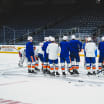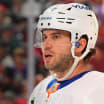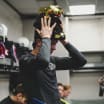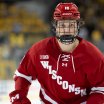The genius of Al (Radar) Arbour that enabled him to become the penultimate hockey coach can be defined in many ways.
For sure the easiest two equations go like this:
1. Arbour = four consecutive Stanley Cups, 1980-1983.
2. Arbour = 19 consecutive playoff series victories 1980-1984.
Maven's Memories: Al Arbour's Trifecta
Three ploys that made Al Arbour one of the game's greatest coaches
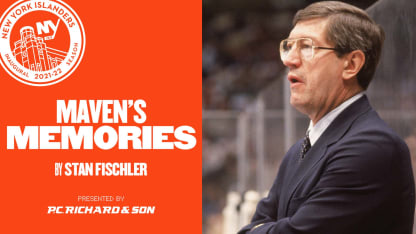
By
Stan Fischler
Special to NHL.com
Apart from those monumental achievements, Radar pulled off some less remembered triumphs that have earned him Hall of Fame status.
"What I remember," GM Bill Torrey once said, "were some of Al's lesser moves -- ploys, if you will -- that turned our team's bad news into good news."
I was there for three of them which I hereby label "Radar's Forgotten Trifecta." Here's how I remember them:
1. TURNING HIS INJURY INTO INSPIRATION:
After his club stunningly defeated the Rangers in the 1975 playoff, the Penguins emerged as the Islanders next foe. As the best-of-seven series unfolded so, too, did a crucial subplot. Al came down with severe back problems.
As his Islanders fell behind Pittsburgh one, two, three games, the coach was in and out of the hospital as well as in and out of traction. Too often separated from his players, Arbour felt depressed. His unhappiness reached a low after the Penguins won their third-straight game.
Finally, Radar ordered a meeting in the clubhouse. From captain Ed Westfall down to goalies Glenn Resch and Bill Smith, there was uncertainty about the gathering.
"The way we were losing," said Resch, "it could have been Al giving us a real, good bawling out."
Quite the contrary.
Al turned the blame on himself. Stunned as the coach began talking, the players were even more amazed at the finish. "I apologize to you," the coach began. "I haven't been able to coach you in the manner that I'd like.
"My back has been giving me problems and I owe you guys an apology for not doing more for you all."
Stunned to the core, each player felt inspired that their coach, himself, would shoulder the blame -- although Radar was blameless -- for the team's debacle.
Resch: "We all came out of that meeting wanting to do anything to help Al and the best medicine we could give him was wins and more wins."
Resch should know. On April 20, 1975 -- to further inspire the club -- Arbour made a pivotal lineup change. He pulled Smith and inserted Resch as his goaltender.
This despite the fact that Chico had not seen action since the second game of the Rangers series.
"Whatever it was that Al did," Resch continued, "we took it from there."
MAVEN'S MEMORIES
WRITTEN COVERAGE
Giving Away the Banks of Gifts -- Almost
Ken Morrow's Moments
First Isles-Rangers Game
Rangers Invade Isles TV Studio
How Chico Resch Became A Goalie
Roland Melanson, Forgotten Hero
Dave Langevin, The Best Bodychecker
The Underrated Kenny Jonsson
Maven's Haven
The Nassaumen won Games Four, Five and Six. In the finale at Pittsburgh, Chico tossed a 1-0 shutout and Captain Westfall got the winner late in the third period.
"The win summed up all that coach had taught us," said Westfall. "All the fellas played hard; we got the big goal and the team played big with great discipline."
2. THE GOALIE PLOY THAT AVOIDED A DOWNFALL:
On April 13, 1982, the best-of-five playoff between the Isles and Penguins was tied at two wins apiece. The two-time defending Cup champions from Nassau figured to be easy victors after finishing the regular season 43 points ahead of Pittsburgh. But it was past the 13th minute of the third period and the Visitors were leading, 3-1.
"We should have been up by five goals," said GM Bill Torrey, "but their goalie, Michel Dion, was having the game of his life. Obviously, we were running out of time."
At 12:56 of the third period, the Isles got a break when Pittsburgh's top defenseman Randy Carlyle took a two-minute penalty. Suddenly, Arbour got a brainstorm.
The coach called a two-minute timeout by replacing goalie Bill Smith -- his starter -- with backup Roland Melanson.
"I had been thinking about such a move," Arbour later explained, "because this was a new rule and I figured it would settle my guys down and stop them from rushing things."
Once Melanson's "warm-up" was over, he returned to the bench and Smitty resumed his place in goal. The Isles swung into their power play. Dion saved on a Clark Gillies' deflection but he couldn't control the rebound.
Defenseman Mike McEwen seized the loose puck and beat Dion with 5:27 remaining. Still, the Penguins held the lead; 3-2 as the clock ticked toward the two-minute mark. Now Arbour had Lady Luck on his side.
This time Carlyle fanned on an Islander dump-in enabling John Tonelli to tie the game at 17:39. Just over six minutes through overtime, Tonelli converted the winner and the Isles won a series they seemed doomed to lose.
And all because the genius coach named Radar called an unexpected time-out.
Watch: Youtube Video
3. CONVERTING THE DOGHOUSE INTO A PLAYOFF CASTLE:
The eventual result of the 1993 Patrick Division Final between the Islanders and Penguins was not supposed to happen. Pittsburgh had won two-straight Stanley Cups and was an odds-on favorite to win a third. Yet on May 14, 1993 the series was tied at three games apiece.
Somehow coach Al Arbour's machinations had managed to put the brakes on such future Hall of Famers as Mario Lemieux and Jaromir Jagr. Without any superstars of his own, New York's coach had to fiddle and faddle with his lineup from game to game.
Worse still, Al's foremost forward, Pierre Turgeon, still was not fully recovered from the Dale Hunter cheap shot that wounded him at the tail end of the Isles playoff victory over Washington.
"We still thought we could beat them," said center Ray Ferraro, now an NHL television analyst. "We were there to win."
But Arbour had a manpower problem. With the still-recuperating Turgeon unavailable for regular play, he needed a replacement.
"It was no secret that David Volek was not my favorite forward," Arbour later explained. "I often had him as a healthy scratch during the regular season. And I hadn't used him that much in the playoffs."
That said, Radar let the Czech right wing out of the doghouse for Game Seven and put him on a line with Ferraro and Tom Fitzgerald. Somehow, the Isles kept the score at 1-1 entering the third period.
Then, it happened. At 6:10 of the third, Volek converted passes from Fitzgerald and Ferraro and beat goalie Tom Barrasso. Three minutes later Benny Hogue made it a 3-1 game but the Pens weren't dead yet.
A late Pitt rally tied the game at 3-3, setting the stage for a sudden-death overtime session that was like a heavyweight championship bout; short in length but long in action.
With Arbour's newfound faith in Volek, Radar dispatched the suddenly-hot Czech to the ice; this time with Ferraro and Derek King.
Just past the five-minute mark, the Isles defenseman Dennis Vaske moved the puck up to Ferraro. As Ray sped down the middle, he found that his mates had created a three-on-one breakout.
With King on his left and Volek on his right; Ferraro had three options -- pass to King; take the shot himself or pass to Volek.
A few steps past the blue line Ray used the latter option and passed to Volek. At first it seemed as if David was off too far at an angle for a good shot but his one-timer was a blur and cleanly beat Barrasso for the series-winner.
It proved to be one of the most astonishing playoff upsets in NHL history; mostly because Al Arbour refused to hold a grudge and released David Volek from the doghouse!



